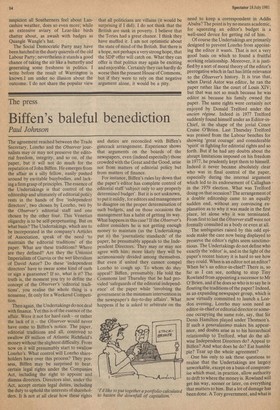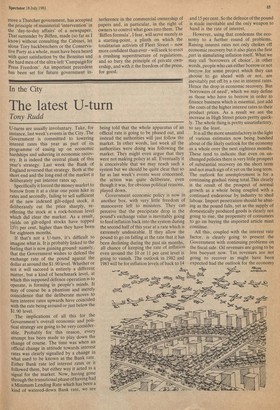The press
Biffen's baleful benediction
Paul Johnson
The agreement reached between the Trade Secretary, Lonrho and the Observer journalists may or may not preserve the editorial freedom, integrity, and so on, of the paper, but it will not do much for the reputation of John Biffen. He emerges from the affair as a silly fellow, easily pushed around by excitable busybodies, and lacking a firm grasp of principles. The essence of the Undertakings is that control of the editorship and ultimately of editorial policy rests in the hands of five 'independent directors', two chosen by Lonrho, two by the Observer's editorial staff and one chosen by the other four. This Venetian oligarchy is to be self-perpetuating. But on what basis? The Undertakings, which are to be incorporated in the company's Articles of Association, speak of the need 'to maintain the editorial traditions' of the paper. What are these traditions? Where are they defined? Are they the Unionist Imperialism of Garvin or the wet liberalism of David Astor? Do these 'independent directors' have to swear some kind of oath or sign a guarantee? If so, what is it? The truth is, the moment you try to define the concept of the Observer's 'editorial traditions', you realise the whole thing is a nonsense, fit only for a Weekend Competition.
Then again, the Undertakings do not deal with finance. Yet this is of the essence of the affair. Were it not for hard cash — or rather the lack of it — the Observer would never have come to Biffen's notice. The paper, editorial traditions and all, contrived to swallow £9 million of Atlantic Richfield's money without the slightest difficulty. From now on it will presumably start to swallow Lonrho's. What control will Lonrho shareholders have over this process? They possess, Biffen may be surprised to hear. certain legal rights under the Companies Act, including the right to appoint and dismiss directors. Directors also, under the Act, accept certain legal duties, including the duty to uphold the interests of shareholders. It is not at all clear how these rights and duties are reconciled with Biffen's gimcrack arrangement. Experience shows that arguments on the boards of the newspapers, even (indeed especially) those crowded with the Great and the Good, arise not from matters of editorial policy but from matters of finance.
For instance, Biffen's rules lay down that the paper's editor has complete control of editorial staff 'subject only to any properly determined budget'. But it is not unknown, to put it mildly, for editors and management to disagree on the proper determination of such budgets, and on those occasions the management has a habit of getting its way. What happens in this case? If the Observer's editor considers he is not getting enough money to maintain (as the Undertakings put it) the 'journalistic standards' of the paper, he presumably appeals to the Independent Directors. They may or may not agree with him; more likely they will be acrimoniously divided among themselves. But even if united they cannot compel Lonrho to cough up. To whom do they appeal? Biffen, presumably. He told the Commons last Thursday that he had provided 'safeguards of the editorial independence' of the paper while 'involving the government in the minimum intervention in the newspaper's day-to-day affairs'. What happens if he is asked to arbitrate on the need to keep a correspondent in Addis Ababa? The point is by no means academic, for squeezing an editor's budget is a well-used device for getting rid of him.
Of course the Undertakings are primarily designed to prevent Lonrho from appointing the editor it wants. That is not a very good basis on which to found a fruitful working relationship. Moreover, it is justified by a sort of moral theory of the editor's prerogative which in fact has little relevance to the Observer's history. It is true that, when David Astor was editor, he ran the paper rather like the court of Louis XIV; but that was not so much because he was editor as because his family owned the paper. The same rights were certainly not enjoyed by Donald Trelford under the ancien regime. Indeed in 1977 Trelford suddenly found himself under an Editor-inChief, in the shape of the jovial Conor Cruise O'Brien. Last Thursday Trelford was praised from the Labour benches for showing 'great courage' and considerable 'spirit' in fighting for editorial rights and so forth. But if he had any doubts about the abrupt limitations imposed on his freedom in 1977, he prudently kept them to himself. Indeed it never became absolutely clear who was in final control of the paper, especially during the internal argument which led to its endorsement of Callaghan in the 1979 election. What was Trelford doing on that occasion? The arrangement of a double editorship came to an equally sudden end, without any convincing explanation as to why it was made in the first place, let alone why it was terminated. From first to last the Observer staff were not formally consulted as a body or even at all.
The ambiguities raised by this odd episode make the care now being displayed to preserve the editor's rights seem sanctimonious. The Undertakings do not define who exactly the 'editor' is, and in the light of the paper's recent history it is hard to see how they could. When is an editor not an editor? When he's an editor-in-chief? There is, so far as I can see, nothing to stop Tiny Rowland from appointing a successor to Mr O'Brien, and if he does so who is to say he is flouting the traditions of the paper? Indeed, as an expanding newspaper group, which is now virtually committed to launch a London evening, Lonrho may soon need an editor-in-chief or editorial director or someone occupying the same role, say, that Sir Denis Hamilton played under Thomson's. If such a generalissimo makes his appearance, and doubts arise as to his hierarchical relationship to Trelford, what do the allwise Independent Directors do? Appeal to Biffen? And what does he do? Eat humble pie? Tear up the whole agreement?
One has only to ask these questions to realise that the Undertakings are largely unworkable, except on a basis of compromise which must, in practice, allow authority to drift to where the money is. Rowland will get his way, sooner or later, on everything that matters to him. But a lot of damage has been done. A Tory government, and what is more a Thatcher government, has accepted the principle of ministerial 'intervention' in the 'day-to-day affairs' of a newspaper. That surrender by Biffen, made (so far as I know) without consulting the Cabinet, let alone Tory backbenchers or the Conservative Party as a whole, must have been heard with quiet satisfaction by the Bennites and the hard men of the ultra-left 'Campaign for Press Freedom'. An important precedent has been set for future government in terference in the commercial ownership of papers and, in particular, in the right of owners to control what goes into them. The 'Biffen formula', I fear, will serve merely as a starting-point, a plinth on which the totalitarian activists of Fleet Street — now more confident than ever — will seek to erect a crushing superstructure of regulations, and so bury the principle of private ownership, and with it the freedom of the press, for good.



































 Previous page
Previous page